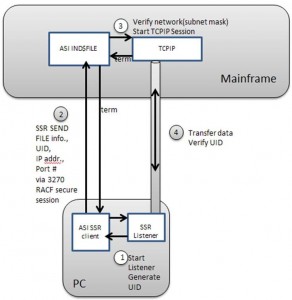SSR Server for TSO/VTAM 5.0 (z/OS) and SSR Client 8.0 (Windows) with TCP/IP File Transfer Support
Combining terminal emulation and TCP/IP for significantly reducing the time to transfer files
Palm Beach Gardens, FL June 1, 2015 – Applied Software, Inc. (www.asisoft.com) developer of mainframe utility software including file transfer programs, announces extensions to their SSR Client/Server product line providing for significant improvements in speeds for transferring files. Some transfer speeds are improved in the order twenty times faster.
SSR Server for TSO & VTAM version 5.0 which runs on IBM z/OS has been extended to include TCP/IP support for interfacing with its counterpart on the PC, SSR Client version 8.0. The SSR Server for TSO & VTAM continues to support the IND$FILE protocol, but now provides the option for a file to be transferred with the TCP/IP protocol which significantly reduces the time it takes to actually transfer the file.
SSR Client version 8.0 runs on a multitude of Windows platforms and with this version has been rewritten under the Visual Basic .NET Visual Studio development platform and takes advantage of the facilities provided by this development platform. One of the facilities it takes advantage of is the .NET TCP/IP capability in order to interact with the SSR Server for TSO & VTAM on z/OS.
Janis Josephson, President and CEO of Applied Software, said,
“This is a major extension of our robust SSR product line. In the past, the time to transfer a file has always been an issue due to the inherent slowness of 3270 emulators. By using emulation to perform short interactions with the mainframe is quite quick, but automatically switching to using TCP/IP to do file transfers which are historically long emulation tasks, we have found significant reduction in transfer times. Some file transfer speeds are improved in the order twenty times faster. This is quite a practical marriage of two different transfer protocols which we are pleased to bring to our client base.”
Below is an illustration of the TCP/IP File Transfer Process:

